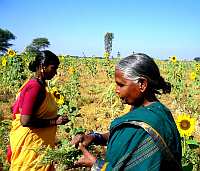Reuters | 10 May 2010

New York, May 7 - Agribusiness giant Cargill's $6 billion Black River arm is making its next big bets on changing eating habits in major developing nations, buying into dairy farms in Asia and breeding fish in Latin America.
Black River Asset Management, which mostly manages third-party capital, plans to close a private equity fund this summer that will target food production, processing and distribution with a focus on dairy and aquaculture segments, said Rich Gammill, managing director and senior portfolio manager for Black River.
The "sweet spot" for the fund is $300 million to $400 million, and will be similar in size to a sister fund that closed earlier this year and is focused on agricultural land investing.
"We're looking for growth equity opportunities," Gammill told Reuters in an interview on the sidelines of an investment conference in New York.
Black River is among a growing number of investment groups establishing positions in global farmland and food production amid concerns about a growing world population and supply and demand imbalances for food, water and energy.

Gammill said the fund is aiming for returns of more than 25 percent a year by investing in new western-style dairy farms in developing parts of Asia. The new farms could require initial investments estimated at $35 million each and will operate with 5,000 to 8,000 cows in areas that have relied largely on small peasant farmers for dairy production, he said.
Black River is partnering with local groups putting the farms together.
"We're not building companies. We're investing in local teams we think know how to do it right," he said.
Gammill said the dairy sector in Asia provides particular opportunities because of broad inefficiencies across production and distribution channels.
In Central America and South America, the focus will be on expanding efficiencies in aquaculture amid growing demand from North America and Europe for farmed fish.
Gammill said one challenge to investing in farmland and food production is a lack of expertise in modernized, highly efficient production practices.
"There is a huge lack of competency in farm management practices in China and India. The efficiencies aren't there yet in emerging markets," he said. "We're so used to efficient food production in the United States. But in China and India a lot of it depends on peasant farmers. It is not an optimized or efficient system and it is unsustainable to meet demand."
Many potential investors remain skittish about the risks associated with emerging markets, Gammill said. But interest and comfort levels were growing.
"People are starting to acknowledge that to meet demand... investor capital needs to be directed toward the supply side. That can be in the form of row crops... or in the form of food production, protein production, which is the biggest driver of that demand," Gammill said.












